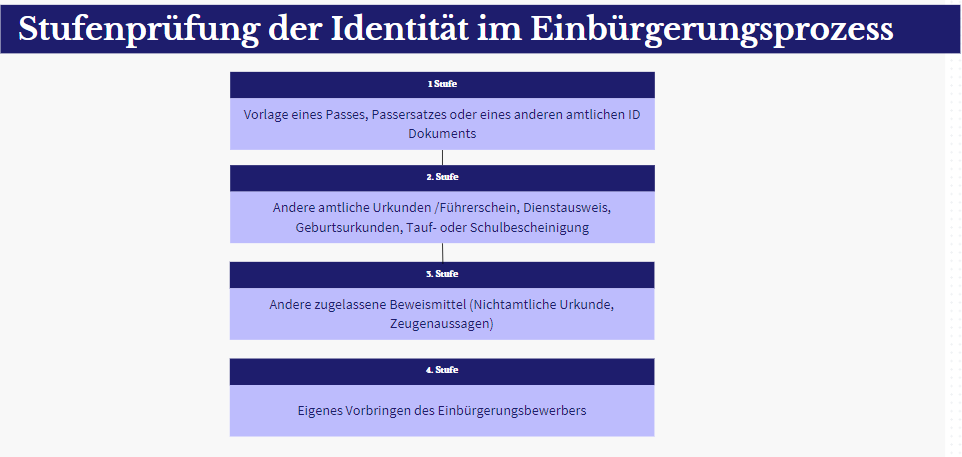Higher Administrative Court of Lower Saxony, April 11, 2024, Case No.: 13 LA 61/23
Facts of the Case:
Naturalization Applicant Had Unresolved Identity
The minor, stateless plaintiff had a Lebanese father and a Turkish mother. The father had been granted a Lebanese passport after being naturalized in Lebanon in 1994 as part of a group naturalization. The mother was registered in the Turkish birth registry, and a Turkish national passport was issued to her in 1988, shortly before entering Germany.
Father and Mother Held Turkish and Lebanese Nationalities
The father had also been issued a Turkish national passport under a different name in 1988. The Turkish Consulate General in Hanover confirmed, after consulting with the relevant Turkish registry office, that the family were Turkish nationals. Nevertheless, the plaintiff had not made any efforts to obtain either a Turkish or a Lebanese passport.
Plaintiff Was Born in Germany and Had Never Left
The plaintiff’s naturalization request was denied due to unresolved identity issues. The plaintiff then filed a lawsuit in the first instance with the Administrative Court of Oldenburg (Case No.: 11 A 8783/17). The Administrative Court upheld the decision of the naturalization authority. Consequently, the plaintiff applied for admission of the appeal to the Higher Administrative Court of Lower Saxony.
Decision of the Higher Administrative Court of Lower Saxony:
First Instance Denied Naturalization
The Higher Administrative Court agreed with the lower court and ruled that the appeal would not be admitted, as the plaintiff was responsible for the unresolved identity issues.
The plaintiff’s argument that her situation differed fundamentally from that of other naturalization applicants who had lived abroad for years because she was born and had spent her entire life in Germany did not lead to a different assessment.
Plaintiff Did Not Sufficiently Attempt to Clarify Identity
The Administrative Court was correct in requiring the clarification of the applicant’s identity and nationality as a mandatory prerequisite for naturalization under § 10 (1) sentence 1 of the German Nationality Act (StAG). The fact that the principle of avoiding multiple nationalities had been abandoned with the law to modernize nationality law, allowing naturalizations generally to occur while accepting multiple nationalities, does not imply that the legislator intended to waive the clarification of nationality. § Section 10 (1) sentence 1 StAG demanded. The mere fact that the Act on the Modernisation of Citizenship Law abandons the previously applicable principle of avoiding multiple nationalities, that naturalisations may in future generally take place with the acceptance of multiple nationalities and that it is therefore no longer necessary to give up the previous nationality or nationalities, cannot lead to the conclusion that the legislator wanted to dispense with clarification of nationality.
Higher Administrative Court Also Saw the Need for Identity Clarification Under the Step Model
The clarification of the applicant’s nationality is a fundamental prerequisite for conducting the still necessary status and security checks, as nationality and identity are mutually influencing. The step model developed by the Federal Administrative Court (judgment of September 23, 2020 – BVerwG 1 C 36.19) still applies, which outlines the requirements for examining and clarifying identity and the corresponding obligations of the applicant. Therefore, the requirement for identity clarification for naturalization under § 10 (1) sentence 1 StAG remains justified, even for foreigners born in Germany.Judgement from. 23.9.2020 - BVerwG 1 C 36.19), the requirements for the examination and clarification of identity and the existing obligations of the naturalisation applicant to cooperate in this respect. The requirement to clarify identity for naturalisation according to § Section 10 (1) sentence 1 StAG is therefore still objectively justified for foreigners born in Germany.
Result: The appeal is not to be admitted.

As a result, the appeal should not be allowed.
Important Note: The content of this article has been prepared to the best of our knowledge and belief. However, due to the complexity and constant evolution of the subject matter, we must exclude liability and warranty. Important Notice: The content of this article has been created to the best of our knowledge and understanding. However, due to the complexity and constant changes in the subject matter, we must exclude any liability and warranty.
If you need legal advice, please feel free to call us at 0221 - 80187670 or send us an email at or send an email to info@mth-partner.de info@mth-partner.de
Lawyers in Cologne advise and represent clients nationwide in immigration law.


